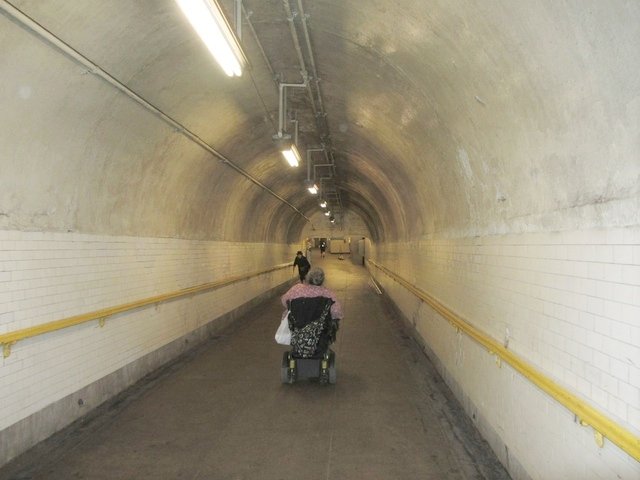Judge Tells MTA To Find Money For More Subway Elevators: 'You Find It For Other Things'
May 23, 2019, 9 a.m.
Disability advocates want to legally force the MTA to install elevators at every subway station.

Accessibility advocate Edith Prentiss <a href="http://gothamist.com/2013/04/12/what_its_like_to_use_the_old_south.php">commuting by subway in 2013</a>.
The reason we have as many elevators in the subway as we do now is because disability rights groups sued the MTA in 1979 and won, forcing the agency to install 54 elevators in stations scattered throughout the system. And that requirement later expanded to 100 elevators by 2020. (The 1979 ruling also led to the creation of the Access-A-Ride program.)
Now, turning to the power of the courts again, disability advocates want to force the MTA to install elevators at every subway station. Out of 472 stations, only 120 are accessible. The current capital plan includes funding for elevators at 25 more stations.
Momentum is building for a more rapid expansion, fueled in part by legal action.
In March, a judge ruled that the MTA had violated the Americans with Disabilities Act when it did a $27 million renovation at the Bronx Middletown Road station but failed to install an elevator. Advocates quickly filed a class action lawsuit, building on that ruling. And this week, a judge announced he could have a ruling as soon as next month on whether the MTA is violating state human rights law by failing to install elevators.
On Tuesday in State Supreme Court, Justice Shlomo Hagler thanked the gallery full of wheelchair users for showing up to court, and he criticized the MTA for not reaching a settlement with the plaintiffs over the past year. He said not having the money wasn’t an excuse anymore. “No money? Find it. You find it for other things,” he said to the MTA’s three lawyers. “There has to be action, no more talk.”
The MTA’s press shop pointed out that New York City Transit President Andy Byford has a plan to create 50 accessible stations in five years and hopes to get full accessibility by 2034.
Advocates said they wanted it in writing.
"We don’t have any binding agreements from the MTA and that's what we really need,” said Susan Dooha, executive director of Center for Independence of the Disabled, NY, a plaintiff in three of the four cases.
“People like Byford come and go; political winds change,” she said. “We need a binding enforceable agreement to make sure the entire system will become accessible, not just a few stations and then stop.”
While the ADA requires the MTA to make stations accessible anytime it does a renovation that affects the usability of a station “regardless of cost,” the law also includes a caveat that it has to be “technically feasible.”
Maia Goodell, supervising attorney at Disability Rights Advocates, which represents clients in all four current lawsuits, said she believes the MTA hasn’t even bothered to see whether elevators are technically feasible in its station renovations.
The MTA won’t comment on any of these cases.
In state court, the MTA’s lawyers argued that they don’t have to install more elevators due to a legal technicality: because the MTA is a state agency, and it’s already following a 1995 state ruling to install 100 elevators, it is therefore exempted from following New York City’s human rights laws and the accessibility requirements.
Meanwhile, on Monday, the MTA’s transit committee signed off on $17.8 million more in spending for the Enhanced Station Initiative (ESI), a nearly $1 billion plan which has already run out of money. Not only was it scaled back from 32 to 19 stations, but none of the plans includes a new elevator.
The only board members at Monday’s meeting to vote against it were Mayor Bill de Blasio’s three appointees. When the recently appointed Transit and Bus committee chair Sarah Feinberg asked if “it makes sense to have a conversation about ESI,” Polly Trottenberg, who voted against it, said, “we’ve had years of it before your arrival.”
Stephen Nessen is the transportation reporter for WNYC. You can follow him on Twitter @s_nessen.
We the Commuters is a weekly newsletter about transportation from WNYC and Gothamist. Sign up below for essential commuting coverage delivered to your inbox every Thursday.